 In my review of the best books I read in 2016, I mentioned that I had not read many good books during the year. I read a few really good books and a lot of mediocre ones. That’s not the case with my 2017 list. For me, 2017 was a very good year for books. But before I get to my list of the ten best books I read in 2017, let me complain a little bit.
In my review of the best books I read in 2016, I mentioned that I had not read many good books during the year. I read a few really good books and a lot of mediocre ones. That’s not the case with my 2017 list. For me, 2017 was a very good year for books. But before I get to my list of the ten best books I read in 2017, let me complain a little bit.
Expectations can be a funny thing. If you’re expectations are low, it’s easy for a good book to surprise you. But the opposite is also true. If too many people tell you how great a book is, it can be hard for that book to meet your expectations.
So, maybe I shouldn’t be surprised that the two Harry Potter books I read this year—Harry Potter and the Sorcerer’s Stone and Harry Potter and the Chamber of Secrets—were disappointing. I had heard people wax poetic about the Harry Potter series for years. They loved J.K. Rowling’s books and the movies that were made from them. They dressed as Harry Potter characters for Halloween (and sometimes not on Halloween), and they made pilgrimages to The Wizarding World of Harry Potter at Universal Studios in Orlando. These people were true fans. Me, not so much.
Author J.K. Rowling has had great success with her Harry Potter books, but I wasn’t impressed. I thought the writing was just okay, and there were big problems with the plots in both books. As you can imagine, neither book made my list for 2017.
I was also very disappointed in Never Let Me Go by Kazuo Ishiguro. Ishiguro is a Nobel Prize winning author who is highly regarded in literary circles, so I had high expectations when I read his 2005 novel. But it didn’t turn out that way. I found his writing on the sentence level to be competent, but his storytelling was far too slow and boring. There’s an old joke about literary writing: nothing much happens, but it happens in great detail. The reason the joke works is because there’s a great deal of truth to it. Ishiguro’s work (at least Never Let Me Go) is the truth behind the joke.
That brings us to this year’s list. Remember, these are books I read in 2017, but they may have been published years ago. Let’s do the list in descending order. Don’t skip ahead. Let the tension build.
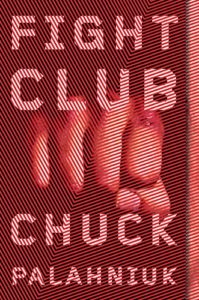
10. Fight Club by Chuck Palahniuk – Is it possible to like a book and be disappointed in it at the same time? That’s exactly how I felt after reading Fight Club, the popular novel first published in 2005. I had heard great things about it, but had never read it. I had heard great things about the movie version of the book, starring Brad Pitt, but had never seen it. So, I came to Fight Club with high expectations, maybe too high. I liked the book, and the psychological nature of the writing, but I can’t say that I loved it. I would definitely recommend Fight Club, but I won’t over-hype it. It’s a good book worth reading, but don’t let the book’s (and movie’s) popularity set your expectations too high.
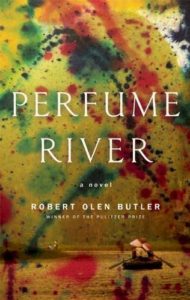 9. Perfume River by Robert Olen Butler – Perfume River was published in 2016, and in 2017 was nominated for the Andrew Carnegie Medal. I had heard a little bit of buzz about the book, so I decided to give it a read. I’m glad I did. The book takes a look back at the Vietnam War from the perspective of Robert, a seventy-year-old history professor at Florida State (where the author is a professor). The Vietnam War split his family apart when his brother, Jimmy, chose to live in Canada rather than serve in a war he didn’t believe in. The family remains split up for nearly fifty years until the family patriarch, a World War II vet, takes ill and dies. The father turned his back on Jimmy when he went to Canada, and it’s up to Robert to try to reunite the family for the father’s funeral. In the meantime, Robert’s marriage to Darla is being strained, and Jimmy’s relationship with his long-time girlfriend becomes more and more complicated. Perfume River is a well-written, engaging story. Although it can be a little slow at times, it’s definitely worth the read.
9. Perfume River by Robert Olen Butler – Perfume River was published in 2016, and in 2017 was nominated for the Andrew Carnegie Medal. I had heard a little bit of buzz about the book, so I decided to give it a read. I’m glad I did. The book takes a look back at the Vietnam War from the perspective of Robert, a seventy-year-old history professor at Florida State (where the author is a professor). The Vietnam War split his family apart when his brother, Jimmy, chose to live in Canada rather than serve in a war he didn’t believe in. The family remains split up for nearly fifty years until the family patriarch, a World War II vet, takes ill and dies. The father turned his back on Jimmy when he went to Canada, and it’s up to Robert to try to reunite the family for the father’s funeral. In the meantime, Robert’s marriage to Darla is being strained, and Jimmy’s relationship with his long-time girlfriend becomes more and more complicated. Perfume River is a well-written, engaging story. Although it can be a little slow at times, it’s definitely worth the read.
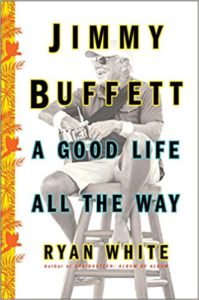 8. Jimmy Buffet: A Good Life All the Way by Ryan White – This is one of two nonfiction books that made this year’s list. I’m a fan of Jimmy Buffet’s music, but even more, I’m intrigued by the lifestyle that has grown up around him. Buffet’s Margaritaville restaurants and hotels have become ubiquitous in resort areas around the country (and a few internationally). Margaritaville has even moved into the 55-and-over residence business. Buffet was behind the creation of Landshark Beer, now owned and marketed by Anheuser-Busch. He is an interesting fellow who has parlayed his easy-going, toes-in-the-sand lifestyle into a wealthy life. And his fans—who refer to themselves as Parrotheads—love him for it. The book chronicles Buffet’s early life in Pascagoula, Mississippi and Mobile, Alabama, his time as a struggling songwriter in Nashville, and his serendipitous move to Key West, where the Jimmy Buffet lifestyle was officially born. To be sure, Ryan White’s book is not a critical look at Buffet’s life and success. It’s more a biography written by an unquestioning fan. Even so, I enjoyed the book and the temporary escape to Margaritaville.
8. Jimmy Buffet: A Good Life All the Way by Ryan White – This is one of two nonfiction books that made this year’s list. I’m a fan of Jimmy Buffet’s music, but even more, I’m intrigued by the lifestyle that has grown up around him. Buffet’s Margaritaville restaurants and hotels have become ubiquitous in resort areas around the country (and a few internationally). Margaritaville has even moved into the 55-and-over residence business. Buffet was behind the creation of Landshark Beer, now owned and marketed by Anheuser-Busch. He is an interesting fellow who has parlayed his easy-going, toes-in-the-sand lifestyle into a wealthy life. And his fans—who refer to themselves as Parrotheads—love him for it. The book chronicles Buffet’s early life in Pascagoula, Mississippi and Mobile, Alabama, his time as a struggling songwriter in Nashville, and his serendipitous move to Key West, where the Jimmy Buffet lifestyle was officially born. To be sure, Ryan White’s book is not a critical look at Buffet’s life and success. It’s more a biography written by an unquestioning fan. Even so, I enjoyed the book and the temporary escape to Margaritaville.
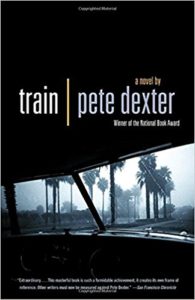 7. Train by Pete Dexter – I have been reading a lot of Pete Dexter recently, and the more I read, the more I appreciate Dexter’s writing and his ability to tell a story. Train is not a new book. It was originally published in 2003 and won the Los Angeles Times Book Prize for Fiction that year. The book takes place in 1953 and follows Lionel “Train” Walk, a young black caddy at a San Diego country club, and his benefactor, Millard Packard, a tough San Diego police detective who makes his own rules, and seems bored with ordinary life. Train appears to be going nowhere in life until Packard shows up at the country club one day. Time and again, Packard intervenes in Train’s life, seemingly without ever asking for anything in return. Train doesn’t understand this white man’s interest in him. In fact, no one seems to understand Packard, who is fearless in any situation, to the point of recklessness. His wife, the victim of a horrific crime Packard investigated, loves him, but also doesn’t understand his unorthodox behavior. Eventually, she fears what she cannot understand. One criticism I have about the book is the ending. As any writer will tell you, endings are hard. In this case, as good a writer as Dexter is, I’m afraid he swung and missed at the ending. Even so, the book is still good enough to make this year’s list.
7. Train by Pete Dexter – I have been reading a lot of Pete Dexter recently, and the more I read, the more I appreciate Dexter’s writing and his ability to tell a story. Train is not a new book. It was originally published in 2003 and won the Los Angeles Times Book Prize for Fiction that year. The book takes place in 1953 and follows Lionel “Train” Walk, a young black caddy at a San Diego country club, and his benefactor, Millard Packard, a tough San Diego police detective who makes his own rules, and seems bored with ordinary life. Train appears to be going nowhere in life until Packard shows up at the country club one day. Time and again, Packard intervenes in Train’s life, seemingly without ever asking for anything in return. Train doesn’t understand this white man’s interest in him. In fact, no one seems to understand Packard, who is fearless in any situation, to the point of recklessness. His wife, the victim of a horrific crime Packard investigated, loves him, but also doesn’t understand his unorthodox behavior. Eventually, she fears what she cannot understand. One criticism I have about the book is the ending. As any writer will tell you, endings are hard. In this case, as good a writer as Dexter is, I’m afraid he swung and missed at the ending. Even so, the book is still good enough to make this year’s list.
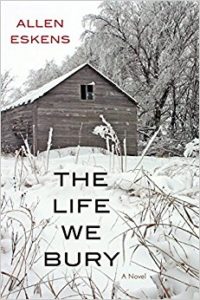 6. The Life We Bury by Allen Eskins – The Life We Bury was published in 2014 and was nominated for several fiction awards. The story is about Joe Tolbert, a college student who has to write a paper for his English class. The assignment is to interview a stranger and write a brief biography. He reluctantly trudges off to a local retirement home to find someone interesting, and he is introduced to Carl Iverson, a Vietnam War hero, and convicted murderer of a teenage girl. Carl has cancer. He was medically paroled to the nursing home and only has a few months to live. Joe has trouble reconciling Carl’s military heroism with the brutal murder he is accused of committing, but the evidence seems overwhelming. As Joe digs deeper, he becomes convinced that Carl is an innocent man. But can he find enough evidence to overturn Carl’s conviction before he dies? The Life We Bury is a fun, compelling read that kept me intrigued from start to finish.
6. The Life We Bury by Allen Eskins – The Life We Bury was published in 2014 and was nominated for several fiction awards. The story is about Joe Tolbert, a college student who has to write a paper for his English class. The assignment is to interview a stranger and write a brief biography. He reluctantly trudges off to a local retirement home to find someone interesting, and he is introduced to Carl Iverson, a Vietnam War hero, and convicted murderer of a teenage girl. Carl has cancer. He was medically paroled to the nursing home and only has a few months to live. Joe has trouble reconciling Carl’s military heroism with the brutal murder he is accused of committing, but the evidence seems overwhelming. As Joe digs deeper, he becomes convinced that Carl is an innocent man. But can he find enough evidence to overturn Carl’s conviction before he dies? The Life We Bury is a fun, compelling read that kept me intrigued from start to finish.
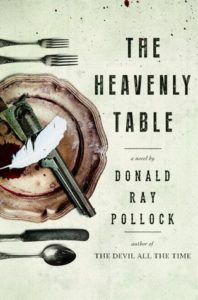 5. The Heavenly Table by Donald Ray Pollock – Published in 2016, The Heavenly Table tells the story of the Jewett brothers, Cane, Cob, and Chimney, and their hardscrabble, murderous journey from the dirt farms of Western Alabama to bucolic Southern Ohio in 1917. As police close in on them, the Jewetts meet Ellsworth and Eula Fiddler, a hard luck couple who take in the brothers and show them a kindness they have not previously experienced. Pollock does a masterful job with his characters. They are flawed and loveable and abhorrent and forgivable. No one is perfect and no one is evil. Just like real people, they are a mixture of good and bad. What comes out depends on the circumstances each character finds themselves in. The Heavenly Table is a terrific book. I plan on reading more Pollock in the upcoming year.
5. The Heavenly Table by Donald Ray Pollock – Published in 2016, The Heavenly Table tells the story of the Jewett brothers, Cane, Cob, and Chimney, and their hardscrabble, murderous journey from the dirt farms of Western Alabama to bucolic Southern Ohio in 1917. As police close in on them, the Jewetts meet Ellsworth and Eula Fiddler, a hard luck couple who take in the brothers and show them a kindness they have not previously experienced. Pollock does a masterful job with his characters. They are flawed and loveable and abhorrent and forgivable. No one is perfect and no one is evil. Just like real people, they are a mixture of good and bad. What comes out depends on the circumstances each character finds themselves in. The Heavenly Table is a terrific book. I plan on reading more Pollock in the upcoming year.
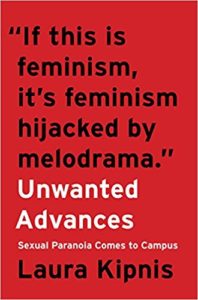 4. Unwanted Advances: Sexual Paranoia Comes to Campus by Laura Kipnis – If you’re not on a college campus, or at least in occasional contact with academia, you may not know that there is a sexual assault crisis going on at universities across the country. Reports claim that 1-in-5 female college students will be raped or sexually assaulted during their time on campus. Yet, author Laura Kipnis, professor at Northwestern University and noted feminist, thinks that not only are the stats misleading (or flat out wrong), but that the focus on women in constant danger of sexual assault on college campuses makes victims of all females and ultimately hurts feminism. In the book, Kipnis lays out the case that not only are cases of sexual assault on campus overblown, but that there is a certain group of feminists who are weaponizing sexual assault claims for political purposes. The book is wonderfully written, meticulously researched, and quite eye-opening.
4. Unwanted Advances: Sexual Paranoia Comes to Campus by Laura Kipnis – If you’re not on a college campus, or at least in occasional contact with academia, you may not know that there is a sexual assault crisis going on at universities across the country. Reports claim that 1-in-5 female college students will be raped or sexually assaulted during their time on campus. Yet, author Laura Kipnis, professor at Northwestern University and noted feminist, thinks that not only are the stats misleading (or flat out wrong), but that the focus on women in constant danger of sexual assault on college campuses makes victims of all females and ultimately hurts feminism. In the book, Kipnis lays out the case that not only are cases of sexual assault on campus overblown, but that there is a certain group of feminists who are weaponizing sexual assault claims for political purposes. The book is wonderfully written, meticulously researched, and quite eye-opening.
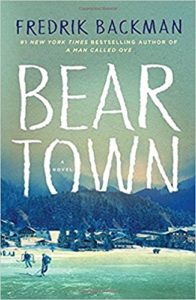 3. Bear Town by Fredrik Backman – Bear Town has been included on many of the “Best of 2017” lists I’ve seen floating around the internet. And with good reason. It’s a terrific book. The village of Bear Town is a tiny community that has seen better days. A lot of the best and brightest have left town, but those that have stayed believe better days are ahead. And they may be right. The junior hockey team—the pride of the town—is on its way to the national championship, a heady honor for such a hard luck town. But carrying the weight of an entire town on such young shoulders is tough business, and when one of the players is accused of raping the daughter of the team’s general manager, loyalties are questioned and friendships are torn apart. I highly recommend Bear Town, not only for the terrific writing and storytelling, but also for the sensitive way the author handled an often-taboo subject. Any other year, Bear Town could have easily been the best book of the year.
3. Bear Town by Fredrik Backman – Bear Town has been included on many of the “Best of 2017” lists I’ve seen floating around the internet. And with good reason. It’s a terrific book. The village of Bear Town is a tiny community that has seen better days. A lot of the best and brightest have left town, but those that have stayed believe better days are ahead. And they may be right. The junior hockey team—the pride of the town—is on its way to the national championship, a heady honor for such a hard luck town. But carrying the weight of an entire town on such young shoulders is tough business, and when one of the players is accused of raping the daughter of the team’s general manager, loyalties are questioned and friendships are torn apart. I highly recommend Bear Town, not only for the terrific writing and storytelling, but also for the sensitive way the author handled an often-taboo subject. Any other year, Bear Town could have easily been the best book of the year.
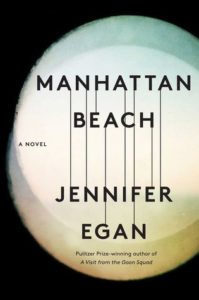 2. Manhattan Beach by Jennifer Egan – Let me say up front that Jennifer Egan is one of my favorite writers. I was a big fan of A Visit From the Goon Squad, and I had high hopes for Manhattan Beach. Egan didn’t disappoint. The book begins in Brooklyn during the Great Depression. Twelve-year old Anna Kerrigan is the apple of her father’s eye, and is his companion when he goes to see Dexter Styles, a mysterious and powerful man who lives in a big house and has uniformed servants at his beckoned call. Years later, Anna’s father has gone missing, and Anna, now a young woman, is working in the Brooklyn Naval Yard, with most of the men in the area off fighting World War II. One night while out drinking with a friend, Anna runs into Dexter, and the chance meeting changes their lives in ways they could have never imagined. Like Bear Town, in any other year, Manhattan Beach could have been the book of the year.
2. Manhattan Beach by Jennifer Egan – Let me say up front that Jennifer Egan is one of my favorite writers. I was a big fan of A Visit From the Goon Squad, and I had high hopes for Manhattan Beach. Egan didn’t disappoint. The book begins in Brooklyn during the Great Depression. Twelve-year old Anna Kerrigan is the apple of her father’s eye, and is his companion when he goes to see Dexter Styles, a mysterious and powerful man who lives in a big house and has uniformed servants at his beckoned call. Years later, Anna’s father has gone missing, and Anna, now a young woman, is working in the Brooklyn Naval Yard, with most of the men in the area off fighting World War II. One night while out drinking with a friend, Anna runs into Dexter, and the chance meeting changes their lives in ways they could have never imagined. Like Bear Town, in any other year, Manhattan Beach could have been the book of the year.
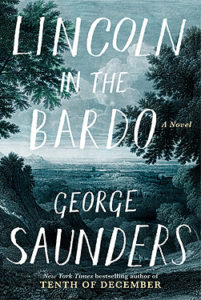 1. Lincoln in the Bardo by George Saunders – Saunders is well-known as one of the world’s great short story writers. Lincoln in the Bardo is his first attempt at a full-fledged novel. On his first try, he hit it out of the park. In fact, in a sense, Saunders created a whole new genre. I know that’s quite a claim, but if it’s not a genre unto itself, then at the very least, it is a literary journey like I’ve never experienced before. Lincoln in the Bardo imagines the conversations of the dead-in-waiting in a Washington, DC cemetery. The Civil War is raging, and President Lincoln’s young son, Willie, has died. Lincoln visits the cemetery to hold his young son’s body. The visit, and Lincoln’s grief, cause a stir among the residents of the cemetery, resulting in strange acts of penance, long gripe sessions, and reflections on lives lived and ultimately lost. I listened to the audiobook version of Lincoln in the Bardo and it was a wonderful experience. I suspect reading the book would be just as enthralling, but I can’t say for sure. Saunders humanity permeates the book and its characters. My guess is that this will come through in the print book every bit as much as it does in the audiobook. I can’t recommend this book highly enough. It is a true work of art.
1. Lincoln in the Bardo by George Saunders – Saunders is well-known as one of the world’s great short story writers. Lincoln in the Bardo is his first attempt at a full-fledged novel. On his first try, he hit it out of the park. In fact, in a sense, Saunders created a whole new genre. I know that’s quite a claim, but if it’s not a genre unto itself, then at the very least, it is a literary journey like I’ve never experienced before. Lincoln in the Bardo imagines the conversations of the dead-in-waiting in a Washington, DC cemetery. The Civil War is raging, and President Lincoln’s young son, Willie, has died. Lincoln visits the cemetery to hold his young son’s body. The visit, and Lincoln’s grief, cause a stir among the residents of the cemetery, resulting in strange acts of penance, long gripe sessions, and reflections on lives lived and ultimately lost. I listened to the audiobook version of Lincoln in the Bardo and it was a wonderful experience. I suspect reading the book would be just as enthralling, but I can’t say for sure. Saunders humanity permeates the book and its characters. My guess is that this will come through in the print book every bit as much as it does in the audiobook. I can’t recommend this book highly enough. It is a true work of art.

I. read all the time but only read one on this list. The Life We Bury. A great read!! Driven is next